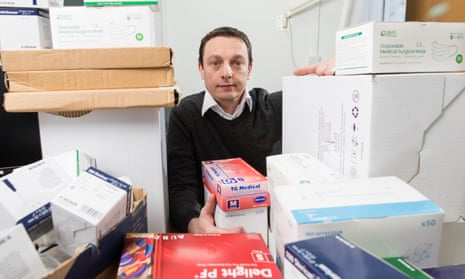With a people under attack in dire need of help, and medical supplies vital to treat the wounded, doctors from across the NHS have been gathering kit, drugs and equipment to take to Ukraine.
This week a convoy of cars, trucks and ambulances will start the long drive from London to the Poland/Ukraine border, carrying tons of much needed stock donated by hospitals, GP surgeries and drug companies.
Once there, some of the medics will start deploying their skills in field hospitals in the war-ravaged country while others help those in refugee camps in Poland displaced by the conflict. All will help relieve the suffering caused by the Russian invasion.
The initiative has been organised by Medical Aid Ukraine, a newly formed group of doctors from across the UK who are collecting donations from hospitals, GP surgeries and drug companies.
It is headed by Dr Roman Cregg, a specialist in pain management at University College London hospital, who was born in Lviv, near Ukraine’s western border. He is taking time off from his NHS role to coordinate the convoy, which on its journey to Poland will join up with several carloads of doctors in France and Germany undertaking the same mission.
He plans to travel over the Poland/Ukraine border into his homeland and work in a field hospital. Other doctors, including anaesthetists and surgeons, will do the same, he said. His wife, Giovanna Russo, a London GP, will stay in Poland to help out in a refugee camp.
Cregg is determined to do what he can to help fellow Ukrainian medics tend to those suffering from gunshot wounds, smoke inhalation and burns. “It feels right to do everything you can to help your country,” he said. “There is simply no question – doctors must help other doctors in this situation wherever possible.
“We have seen our Ukrainian colleagues [in the NHS] being recalled to serve as army medics to support their country, leaving their loved ones behind in the UK.”
Ukraine’s ministries of health and defence tell Medical Aid Ukraine what supplies they need most and then its network sets to work doing its best to source them from willing donors. “Half of all NHS hospitals have made donations to us already”, said Cregg.
His trust has already donated boxloads of supplies including surgical masks, gowns and gloves. As with many hospitals’ donations, most are stocks that have expired or are close to expiry or are no longer needed because Covid has ebbed.
One Medical Aid Ukraine member, Dr Sophie Wallace, a lecturer in clinical medical education, has arranged for private pilots to fly donated equipment from various parts of the UK.
Another member, Dr Malgorzata Starczewska, an intensive care specialist who works at a major trauma centre, has sourced the equipment needed to put together intensive care units in Ukraine and is in talks with a Polish airline to transport that to Poland.
Dr Alicja Jasinka-Piadlo, an A&E doctor in Northern Ireland, is taking unpaid leave to work in a refugee camp in Poland. She has previously undertaken similar work in 2015, in the “jungle” camp in Calais, along the Austrian border and also at train stations, when a record 1.3m migrants and refugees came to Europe.
Dr Rebecca Cranfield, an emergency medicine doctor in Edinburgh, has mobilised the On-Call Room, a network of 11,400 medics that she runs, to donate to help Medical Aid Ukraine raise the funds to cover the cost of both equipment and transporting the supplies to Poland.
Prof Stephen Powis, NHS England’s national medical director, praised the doctors’ initiative. “I am incredibly proud of the work being done by our colleagues, and it speaks to the courage and kindness displayed by NHS staff on a daily basis that so many are going above and beyond, either by helping to coordinate deliveries of supplies or providing medical support on the ground,” he said.
